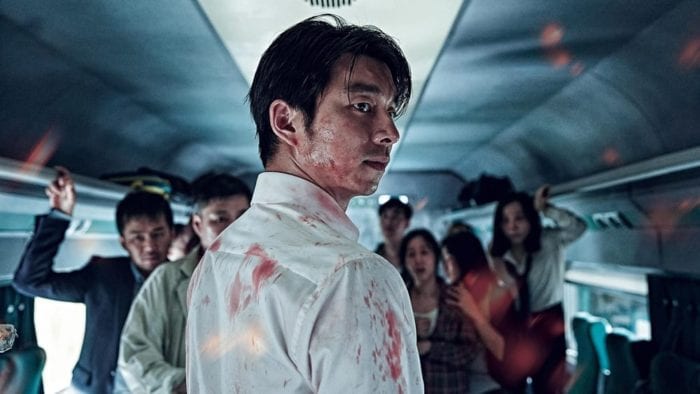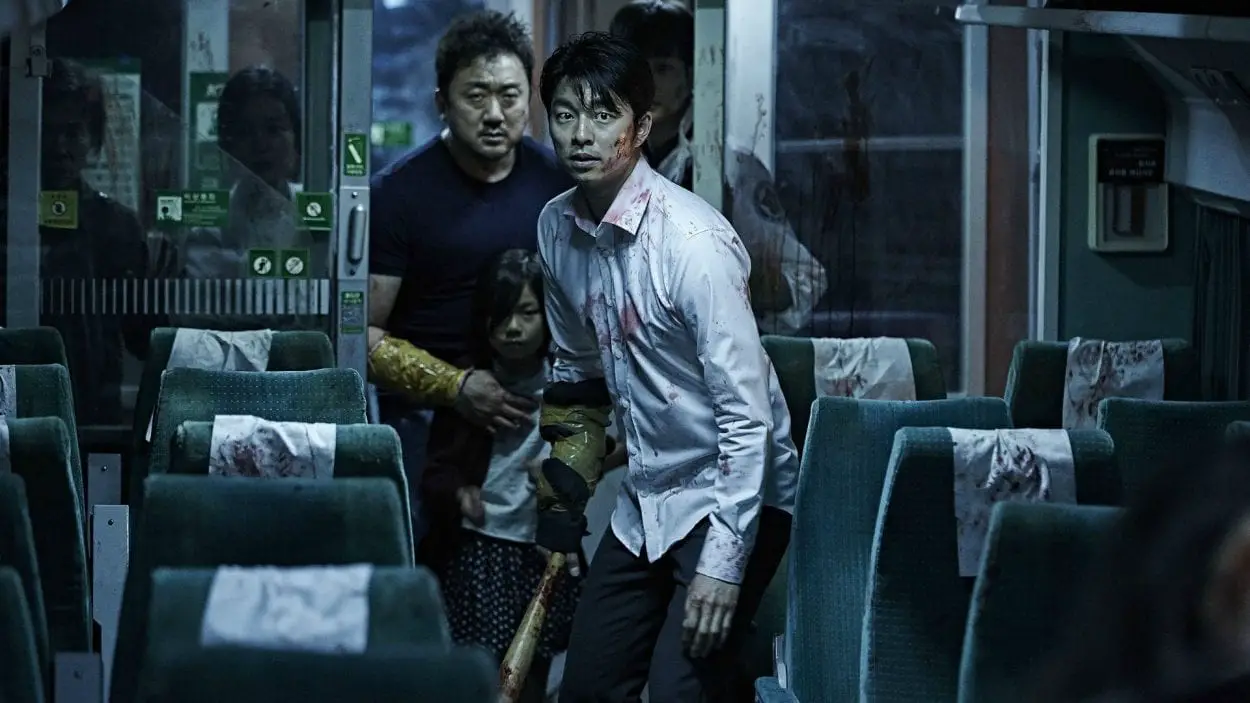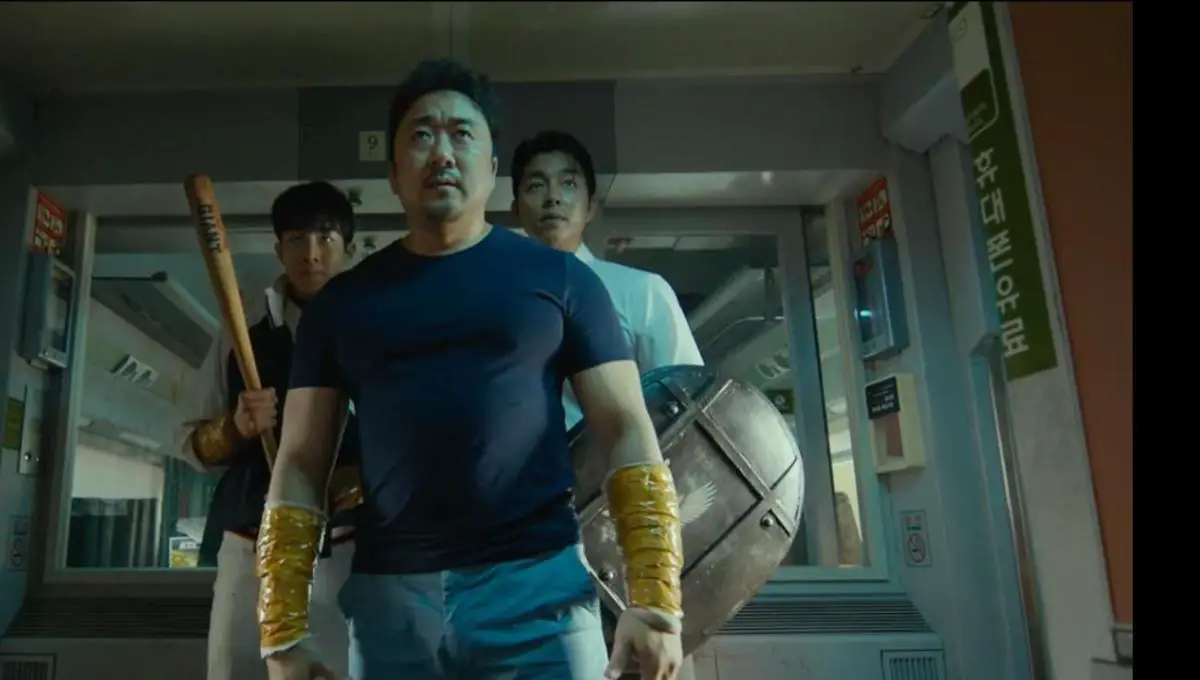Seeing as how Parasite rightfully just won Best Picture at the 92nd Academy Awards and became the first foreign-language film to do so, I saw it fit to take a dive into another South Korean film that is a particular favorite of mine: Train to Busan. This movie from 2016 is a masterpiece of the zombie genre, and it is gripping from start to finish. The movie does so many things right, it is able to avoid the issues and pitfalls that can plague other zombie movies. Moreover, the movie is so beloved, it is actually getting an English remake AND a Korean sequel. Train to Busan is perhaps the best zombie film I have ever seen, and it is not hard to see why. With nuance and subtleties tied in with some of the best action sequences around, there is not a whole lot to see wrong with this film.
The film is just like the title says; it takes place on a train from Seoul to Busan, with a whole myriad of characters along for the ride. The main protagonists are Seok-woo and Su-an, the divorcer, workaholic, and absentee father and his young daughter who is taking to Busan to visit her mother. Along with them are Sang-hwa and Seong-kyeong, an average hard-working man and his very pregnant wife, a young baseball team and some cheerleaders, a rich businessman, a homeless man, and a variety of train workers and other riders. Without giving too much away, these characters all pull apart as well as come together at different points in the film while things are going absolutely sideways.

The film starts exactly as you would think as well; everyone is boarding the train for the roughly three-hour trip, but right away audiences can see things are starting to go wrong. Like some other films, we are unaware of any deadly zombie virus, alien attack, or whatever inciting incident that causes it to spring up. That being said, they slowly start to show themselves on screen in very unique and startling ways that really give a unique take on what a zombie attack might look like. Once all the passengers are on the train, things seem safe for a while. However, zombies obviously have their way with just enough people for there to be a problem, and before you know it, everyone on board is in danger.
I will not give away any more of the plot, because this film is truly a sight to behold. Where some films might go one direction, it feels like Train to Busan goes in the opposite direction, and boy does it pay off. And on top of that, this is not at all a gore-fest on a train; this movie is interlaced with so much nuance and subtlety amidst all the action and horror, it is more of a complete film than some other famous zombie films.

At the same time, interestingly enough, those same other famous zombie movies very much influence Train to Busan. The zombies in the film are very much derived from the zombies of World War Z; fast, angry, and moving with reckless abandon. There might not be a “last man in the world” theme like there was in I am Legend, but the plot devices used in terms of character development are seemingly from the same vein as well. And while I cannot compare too much to The Walking Dead due it being a massive television series, there are small hunts here and there that Train to Busan draws from as well. By taking the best parts from these three examples, as well as a few others, Train to Busan comes out of the gate with a full head of steam, knowing that what is in store is not only satisfying for the viewer but the best zombie movie the viewer has ever seen.
I briefly mentioned it before, but the movie flourishes in the subplots that are interwoven with the main overarching plot. The movies treats the train is the ultimate meeting place; a conglomeration of people that would otherwise never meet in their daily lives. Because of that, there are quite a few times where tempers run high, people disagree, and amid all the panic, people are fighting each other when they should be fending off the zombies. The main characters of Seok-woo and Sang-hwa have a testy relationship at first, with the latter not liking the former’s parenting style. This subplot ties into the next one, which is the fact that Seok-woo is an absentee father who does not do enough for his daughter, Su-an. This subplot weaves into the next one, which weaves into the next one, and so on and so on. It is very rare that you can see such a well-written plot, especially when much of the movie is dominated by action in the first place.

And don’t get me wrong, this is not a game of red-light-green-light with the zombies. What I mean is, we don’t see zombies, then get character development, then zombies, the plot development. No, all of these things are seemingly happening at the same time, which makes the interconnectedness of plot and action all the move impressive. After a number of quarrels between characters and more than a few heart-wrenching moments, the movie comes to a surprising climax, which had me on the edge of my seat. While I did not do so at the time, after the fact I was able to draw the dots between the action and the plot and figure out just how the film got to its climax. Sometimes in movies, you stop and wonder, “how did we get here?” In Train to Busan, you’ll wonder after the fact, “I can’t believe they got there and got out of there!”
I could really dive into what makes each character tick, but that would make this article far too long, as well as spoil the entire film. All you need to know right now is, there are very few films that complement each part of itself as well as Train to Busan does. It may be an international film, which may make some people to immediately to not give it a chance. But, I urge you to see this film. Not only does it truly take you on a ride that you never thought you would be on, but you’ll find yourself asking you the very same questions that the characters during their story-arcs. It may not be an existential masterpiece, but it does just enough in terms of story to really make it a powerhouse of zombie filmmaking. Train to Busan is quite possibly my favorite international film, and I hope you make it yours someday soon as well!


